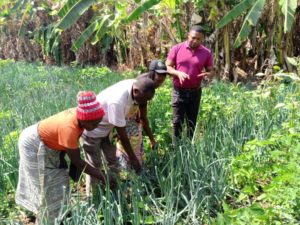Over 8,000 farmers benefit from improved access to markets in Zambia
In response to food shortages and unsustainable agricultural markets that escalated during the 2022-2023 farming season, coupled with the severe drought that affected Zambia in the 2023-2024 farming season, Empowering Farmers Foundation (EFF) partnered with Feed the Future and USAID/Zambia through the USAID Africa Trade and Investment (ATI) initiative. This collaboration aimed to provide much-needed support in food security by improving productivity, reducing post-harvest losses, and promoting sustainable agricultural income through market linkages for smallholder farmers.
Together with our consortium partners, Africa Global Schaffer (AfGS) and Bechtel.Org, we established five Seasonal Open Marketplaces (SOMs) to connect farmers and traders in high-production agricultural areas in the Eastern and Central provinces of Zambia. The programme’s main objectives were to empower farming communities to;
- Aggregate agricultural products such as maize, soybeans, sunflower, and peanuts.
- Improve postharvest handling practices, including cleaning, drying, grading, and storage, to reduce losses.
- Strengthen the capacity of smallholder farmers to market their products, secure higher prices, promote a competitive environment for fair trade, and encourage both domestic and regional trade.
- Facilitate input access such as fertilizers, certified planting seed, pesticides and agricultural implements.
Achievements to date
Bridging market gaps through Seasonal Open Marketplaces (SOMs)
EFF supported the establishment of five Seasonal Open Marketplaces (SOMs) in the Eastern and Central provinces of Zambia. Through these markets farmers are able to aggregate their produce, such as maize, soybeans, sunflower, and peanuts; benefit from services such as cleaning, drying, grading, and storage to reduce postharvest losses; and sell their produce in close proximity to their farms, saving on transport and time costs especially for women who are also care givers at their respective homes.
- The SOMs provided a market for over 8,000 smallholder farmers to trade their produce.
- Trade of over 5,000 metric tons of grains and other agricultural products valued at US $1.9M was recorded within 12 months.
- 108 private sector businesses through supplying goods and services were supported.
- The SOMs also facilitated agriculture input access worth US$ 7,760 through 15 agriculture road shows.
- Over 8,000 farmers have been trained in climate-smart agriculture, gaining essential skills such as winter crop production, proper fertilizer application, crop spacing, pest control, and post-harvest handling practices. This training has empowered them to enhance productivity, improve product quality, and secure better market prices.
Advancing food security through winter demonstration plots
To promote food security and sustainable farming practices, EFF introduced 20 farmer focused groups and 6 winter demonstration plots at each SOM site. The farmer focused groups demo plots focused on improved agriculture productivity through Climate Smart Agriculture (CSA), especially the optimisation of minimal water available through irrigation and soil health improvement using agricultural lime and blended fertilizers. The winter demo plots were established to teach farmers sustainable techniques for winter crop production, including maize, tomatoes, and onions. These trainings also incorporate basic soil health practices, such as compost manure use and water harvesting to boost sustainable farming and food security within these communities. Simple tools such as rain gauges to monitor rainfall and soil PH meters to measure soil moisture and PH were introduced to farmers in the communities.:

Establishment of container-based SOM offices
To further support the SOMs, EFF has addressed the need for permanent and accessible facilities. Initially, three of the SOMs in Manjazi, Kafumbwe, and Chanje were operating from rented premises. Recognising the importance of a sustainable model, EFF installed 40-foot containers on community-donated land to serve as SOM offices and storage facilities. These containers not only reduce operational costs by eliminating monthly rental charges but also by providing secure and durable, structures which the farmers are using as an office and as storage facilities for their inputs and tools.
Introduction of handheld mechanized groundnut threshers to improve efficiency and quality
To improve efficiency and save time for women farmers at the community level, EFF introduced handheld mechanized groundnut threshers at the SOMs. This innovation significantly transformed processing time, enabling farmers to thresh 6 * 30-kilogram bags of groundnuts (peanuts) in just 45 minutes—a task that would have previously taken them three days to complete by hand. In addition to saving time, the threshers allowed women farmers to deliver high-quality nuts to the market, as they no longer needed to sprinkle water on the groundnuts to soften the cover—a practice that previously compromised the quality and marketability of the nuts. The time saved from threshing and the higher market prices for the improved quality directly translated into higher incomes, which the farmers could allocate to other family needs and activities, further empowering them and enhancing their livelihoods.
Looking ahead
As EFF concludes its role in this project, we are proud to have handed over the management of all five SOMs to the communities they serve. We worked closely with community members to ensure they have the tools, knowledge, and structure needed to sustain SOM operations independently. Key roles, including SOM Mobilizer, Grain Grader, Bookkeeper, and Security Guard, were identified and filled to support ongoing operations and preserve the impact we’ve achieved together. We look forward to witnessing the continued growth and prosperity of these communities, knowing they now have the means to thrive independently.
At EFF, we believe that projects like the SOM initiative are more than short-term solutions—they are investments in the future of Africa’s agriculture, driving sustainable growth and economic empowerment.
